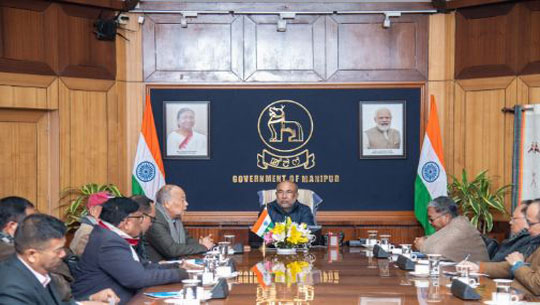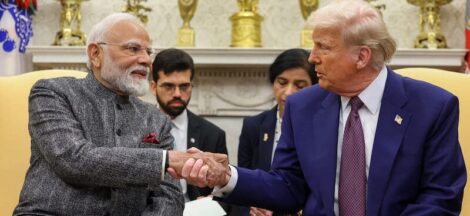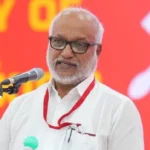By Rabindra Nath Sinha
KOLKATA: Though happy that ultimately the warring Manipur groups – the Meiteis and the Kuki-Zos – sat across the table with the Union government on April 5, Saturday in New Delhi yet the home ministry team led by advisor (North-East) A K Mishra has had its share of disappointment that its much-desired joint resolution as an outcome of the meeting did not fructify. In the words of political observers and civil society organization representatives who kept themselves informed on the proceedings, it was an intense disappointment which can be described as one “bordering on anger”.
The home ministry team could not force its way through. Informed quarters, however, agreed that it was a breakthrough of sorts, given the fact that Manipur has been witness to one of the worst and prolonged ethnic strife that began on May 3, 2023 and hardening of postures on both sides had been responsible for widespread disruption of normal life, thousands of panicked people deserting their home and hearth and some 260 people succumbing to violence. One more telling proof of what the condition has been is the large-scale theft of weapons and ammunition from state armouries.
The home ministry team made a draft of six key points for deliberations at the conclusion of which they could form the basis for a joint resolution. The Meitei side represented there was amenable to the idea but the Kuki-Zo side contended that a joint resolution on the very sensitive issue that has a bearing on the state’s future cannot be rushed through and “our people have to be taken into confidence and their views ascertained”. Kuki-Zo Council (KZC) chairman Henliangthang Thanglet, however, was generous in calling the exercise “historic”. The Valley was represented by two CSOs – All Manipur United Clubs’ Organisation (Amuco) and the Federation of Civil Society Organisations The Hills were represented by KZC and the Zomi Council.
Be that as it may, there is reason to argue that on the Meitei side unanimity was, perhaps, a casualty. The well-established CSO, Coordinating Committee on Manipur Integrity (Cocomi), though invited by the ministry to participate, did not make it. In a statement on the day of the meeting, Cocomi said: “It had declined to participate in the meeting, calling it a yet another tactical manoeuvre to fabricate an illusion of progress, conveniently timed to furnish talking points for the Home Minister’s parliamentary address”. It is a strongly worded statement that reveals less and conceals more; on the face it, the statement does suggest differences with the outfits devoted to the cause of the Meiteis; but when stretched a point and read between the lines, it also indicates that the home ministry and its political master are being lenient, conciliatory towards the Kuki-Zos which has been vociferously demanding administrative separation from the Valley.
Amuco’s participation has evoked some not-so-favourable comments. “The meeting was called to discuss serious matter. How can clubs — may be for outdoor and indoor sports or for cultural activity – be involved in such serious matter. Are they competent to give inputs and suggestions on the issues at stake? The participation should be at a high level with persons known for their sagacity, field work among masses and leadership qualities, opined chairman of Zomi Council Vumsuan Naulak while giving his assessment to IPA. Asked about the next meeting, Naulak said it appeared the ministry was keen on having it at the end of this month; but later it was left undecided. In any case, it was a good beginning. Hope at the next meeting compatibility would be a key factor in the decision by the two sides regarding the level of representation. Sincerity has to be there, the Zomi Council chairman emphasised. In this context it may be mentioned that in both Houses of Parliament home minister Amit Shah attributed the situation in Manipur to “interpretations” of the Manipur High Court’s order on the subject of ST status for Meiteis”.
Six points of the draft: Each side will appeal to its people to refrain from violence against members of the other community; Both sides appreciate steps taken by the governor to restore peace, including facilitating the surrender of arms …. ; Both sides acknowledge the difficulties faced by the public because of the restrictions on free movement on Manipur’s national highways and will cooperate to normalize travel on the highways ; Both sides will welcome any government initiative to facilitate homecoming by the displaced, subject to logistics and security arrangements made by the government ; Both sides appeal to the Governor to prioritise development in the areas neglected during the conflict and Both sides agree to all long-term and contentious issues being taken up with the Centre for resolution through dialogue.
The sixth and the ultimate point of the draft is of administrative and political import in that the authority to sort out contentious issues will be that of the ministry of home affairs (MHA) and there will be little scope for state political parties to have their say. In fact, excessive control of MHA over Manipur affairs even when an elected government was in office has been proving a spoiler. The Cocomi statement on non-participation at the April 5 meeting is indicative, sources told IPA. (IPA Service)




 Strengthening CPI(M) New General Secretary M A Baby’s Top Priority
Strengthening CPI(M) New General Secretary M A Baby’s Top Priority 